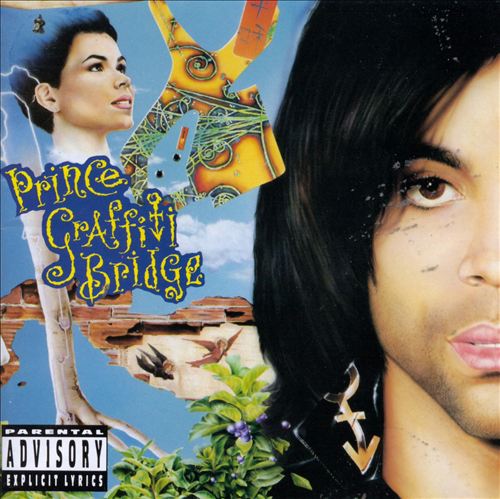
Graffiti Bridge (1990)

1. Can't Stop This Feeling I Got
2. New Power Generation
3. Release It
4. The Question of U
5. Elephants & Flowers
6. Round and Round
7. We Can Funk
8. Joy in Repetition
9. Love Machine
10.Tick, Tick, Bang
11.Shake!
12.Thieves in the Temple
13.The Latest Fashion
14.Melody Cool
15.Still Would Stand All Time
16.Graffiti Bridge
17.New Power Generation (Part II)
By the time the ‘90s rolled around, the peak years of Prince’s career were already in the rearview mirror—though no one quite realized it at the time. He’d continue to release strong material for years to come, of course, but the stretch of unbroken brilliance from the early and mid-’80s was over. Whether that was by design or simply a shift in the cultural wind is anyone’s guess. Prince was never one to coast on past success, and he seemed more interested in challenging himself creatively than chasing another Purple Rain. Which brings us to Graffiti Bridge, an album that, in many ways, feels more like a passion project than a deliberate attempt at commercial glory.
First off, let’s clear one thing up: this isn’t really a Prince album in the traditional sense. He’s the guiding force behind it, no doubt, but this is very much a group effort. A rotating cast of guest vocalists and featured acts appear throughout—including Tevin Campbell, Mavis Staples, and The Time—making the whole thing feel more like a compilation than a cohesive solo statement. It probably should’ve been billed as something like "Prince & Friends.” The album was also tied to a film of the same name, another would-be cinematic triumph that instead went the way of Under the Cherry Moon—a critical and commercial misfire. Not having seen the film doesn’t help the listening experience much either. Without the visuals to provide context, the album often comes across as a collection of unrelated performances strung together by a loose thematic thread.
That said, the music itself is consistently strong. If not quite groundbreaking, it’s at least solid. Tick, Tick, Bang has a contagious swagger to it, while We Can Funk (featuring George Clinton) brings a welcome dash of Parliament-style sleaze to the mix. These tracks don’t reinvent the wheel, but they keep things interesting. The problem is, very little of it sticks. The songs are good, not great. Fun, not essential. There’s a pleasant energy running through the entire album, but it rarely rises above the level of "pretty decent." In a catalog as deep and varied as Prince’s, that can be a tough spot to occupy.
This is also one of Prince’s more upbeat records, both in sound and sentiment. Joy, love, and spirituality dominate the lyrical themes, which—if you're in the right mood—can make for a genuinely enjoyable listen. It’s curious, then, that the album comes stamped with a parental advisory warning. Aside from a few steamy moments (most notably Love Machine), this is a surprisingly clean release, especially when compared to some of Prince’s earlier work. The album leans more into inspiration than provocation, which, for better or worse, shapes the listening experience.
At nearly 70 minutes, Graffiti Bridge also asks a bit more of the listener’s patience than it probably earns. With so many different voices, styles, and ideas on display, it can start to feel more like a playlist than an album. There’s no denying that it’s well-made, and many of the individual components are strong on their own. But as a whole, it lacks that unmistakable spark that defined Prince’s greatest work. For completists, it’s worth the journey. For casual fans, it might feel more like homework.
Go back to the main page
Go to the Next Review